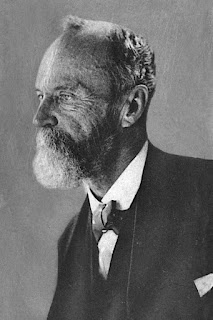In my Psychology and Christianity class we start off by talking about William James.
I don't jump right into The Varieties of Religious Experience as you might guess. I get to that in Lecture Two. In the first lecture I talk about William James and his philosophical project, pragmatism.
Many of my students don't quite know how to approach or think about religion from a scientific, psychological perspective. Faith is something to be believed, not studied under a microscope. So to help my students make this transition I introduce them to pragmatism.
According to William James and the pragmatists, truth works, truth does things in the world. To quote James, "the ultimate test for us of what a truth means is the conduct it dictates or inspires."
This is a different frame for my students. My students tend to frame the issue of religious truth as a metaphysical question. James shifts them away from metaphysics into a pragmatic frame. We might not be able, as psychologists, to adjudicate between religious claims on metaphysical grounds. We're psychologists, not theologians. But as psychologists, we can ask and answer the pragmatic question: What sort of conduct does this religious belief dictate or inspire?
And we don't have to focus so narrowly on behavior. A psychologist can also ask, What sorts of thoughts and feelings are associated with this particular religious belief?
Specifically, is belief X associated with love or hate? Joy or fear? Welcoming of difference or xenophobia? Feelings of grace or feelings of guilt? And on and on.
A psychological approach to religious faith, I tell my students, focuses on these pragmatic questions, the relationship between belief and the fruits of those beliefs.
We can ask this question: What sort of human being does this belief produce?

No comments:
Post a Comment